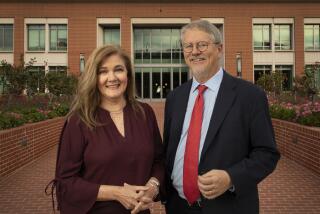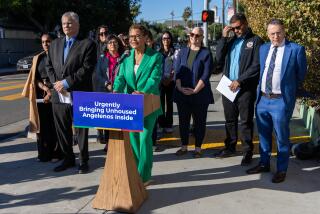Editorial: Garcetti’s proposed spending on the homeless is reasonable. But his funding plan is wishful thinking
It’s one thing for elected officials to declare war, essentially, on homelessness in Los Angeles, as they did at the beginning of the year, unveiling sweeping strategies to combat this intractable problem. It’s another thing to find the money to put those plans into effect. Mayor Eric Garcetti’s proposed budget, the first since the city’s Comprehensive Homeless Strategy was approved, sets aside $138 million for services and housing for homeless people. That’s four times what the city budget allocated last year for homelessness services. And it would be a welcome infusion of funding in a county of 44,000 homeless people, 26,000 of them in the city of LA. But as the City Council’s Budget and Finance Committee began reviewing the mayor’s budget for the city this past week , they should keep this in mind: half of the proposed funding to fight homelessness depends on money from sources that have yet to materialize.
About $71 million would come from the General Fund and city departments and go toward an array of services, emergency shelters, and rental subsidies. However, the other $67 million—which would be put only toward housing for homeless people and affordable housing—comes from proposed fees and real estate sales. $20 million would come from so-called “linkage fees” on new development and $47 million would come from the sale of eight city-owned surplus properties. City officials call this a conservative estimate that takes into account the possibility that some properties will be sold out right and others may be developed into housing. The appraised total market value of all the properties, according to the city, is $86.5 million.
Both the linkage fee and the earmarking of city property for sale or development are enterprising approaches to generating revenue for housing for homeless individuals. They dovetail with the city’s homelessness strategy and they demonstrate that elected officials are finally giving this issue the priority it deserves.
The question is whether Garcetti and the council can make this funding stream happen. Linkage fees have not been popular with developers in the past. Garcetti, who has been promoting this idea for months, has said that some developers are now supportive. The fee, which can be levied on a broad range of development, from houses to commercial projects, is intended to mitigate the impact of the new development on affordable housing. San Francisco, Oakland, San Diego all have linkage fees. The revenue in this case would go to finance permanent supportive housing for the neediest of homeless people and affordable housing for low-income residents. An essential study on the fee is still in process and won’t be completed for several months.
Garcetti has touted new sources of revenue before that did not come to fruition. In his state of the city speech last year, he announced that the city would raise $5 million for the Affordable Housing Trust Fund by collecting taxes from Airbnb for the first time. However, the city did not reach an agreement with Airbnb and hasn’t collected the promised $5 million. It was a promise built on the belief that the city could overcome political obstacles which it failed to do.
What we hope, in this situation, is that Garcetti and the council members lobby developers and homelessness advocates hard to get their support and make this happen. And though ultimately it will fall to council members to approve the linkage fee, Garcetti shouldn’t rely on the council to do all the heavy lifting here. He should use his bully pulpit to campaign for this fee. Much the way he pushed through groundbreaking earthquake retrofitting ordinances that initially made renters and landlords alike fret, he should do the same here.
As for the city’s vacant and under-used sites, they have yet to be sold. On the sites where city officials choose to develop housing--whether affordable or permanent supportive--they may face opposition from residents in the community. Even though most of the properties are zoned for commercial, industrial, or public facility use.
The point is that none of these are done deals. And even if they were, it wouldn’t take care of all the funding that the city estimates it needs--$1.85 billion over ten years—to create sufficient housing and services for the homeless population. City and county officials are considering other revenue sources, including possible sales tax increases and general obligation bonds, that would have to be taken to the voters for their approval.
That said, the mayor and city council members should marshal their collective political will and make it clear that residents and developers alike must see that they have to be part of the solution if the problem of homelessness is ever going to be tackled significantly in Los Angeles. That means developers contributing by linkage fees to the creation of a desperately needed supply of affordable housing and that means residents accepting that getting homeless people off the streets means getting them into homes in their neighborhoods. If elected officials can make that message clear, then maybe they can get the funds for this housing effort.
Follow the Opinion section on Twitter @latimesopinion and Facebook
More to Read
A cure for the common opinion
Get thought-provoking perspectives with our weekly newsletter.
You may occasionally receive promotional content from the Los Angeles Times.






